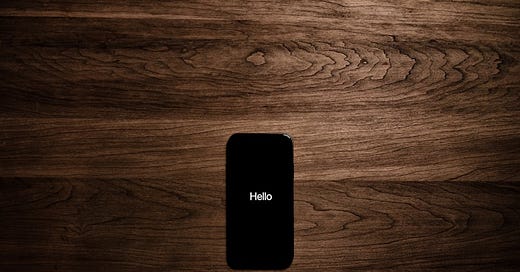I recently met with a student who’s a wonderful singer and wanted my help/advice on building her social media following. When I finished sharing a high-level overview of the process, she sighed and said: “Wow… I had no idea social media was so complicated. You usually scroll through people’s content in 15 seconds, and you don’t realize how much work they’re putting into it.”
It was wonderful observation concerning an important but largely overlooked principle in life that everyone needs to understand and appreciate:
When something extremely valuable looks simple, it’s not actually simple. You just don’t understand it.
This principle obviously applies to startups. Most new entrepreneurs launch startups thinking the work is going to be easy, they’re going to make lots of money, and, best of all, they’re going to love “being their own boss.” But, as most of you reading this surely know, that’s not what startups are actually like.
The principle also extends well beyond startups. In cooking, for example, simple-looking dishes are often some of the hardest to get right (or, put another way, they’re the easiest to mess up). In the graphic design world, a simple, clean, elegant logo can take months worth of effort. In the sports world, NASCAR gets laughed at as little more than “people driving in circles,” but, the truth is much more complex. If you don’t believe me, try driving a car a 200 mph for six hours with 20 other cars around you and see what it feels like. You’ll be lucky to survive.
The point is, never get fooled by simplicity. Simplicity isn’t easy. Simplicity is one of the hardest things to accomplish in both entrepreneurship and life.
-Aaron
The 3 Skills You Didn’t Know You Needed as an Entrepreneur
Tired of generic startup advice that you could get from ChatGPT? Here are some startup skills you can only learn from a successful startup founder.
Stop Annoying Investors With This Common Mistake in Your Fundraising Emails
If investors aren’t responding to your meeting requests, this simple mistake could be the reason.
Office Hours Q&A
———————
QUESTION:
[NOTE: I received this question in response to this week’s article where I discuss the importance of proposing specific times in emails when requesting meetings with investors.]
Do you think sending a Calendly link would be rude? It’s just so much easier.
-Sarah
----------
Three or four years ago, I would have said emailing an investor (or potential client, or any person you didn’t know), was a huge no-no. Now, I do it in every cold email I send to get guests on my podcast, and it works pretty damn well. I realize it’s not the same as emailing an investor, but it’s similar, and it’s led me to often wonder whether I’d send a Calendly link in an email to an investor if I was fundraising today.
To be clear, I don’t think I was wrong about being anti-calendar link a few years ago. The perceptions of sending a link have changed. More people understand how frustrating and annoying scheduling emails can be, so a self-scheduling tool is often a wonderful relief.
At the same time, emailing investors for the first time has strange power dynamics to it that you can’t overlook. Specifically, expecting an investor to take time to look at your calendar might come across as trying to make the investor chase you. But, again, that was more so the case a few years ago than it is now. These days, I have to believe some investors would appreciate the simplicity of scheduling via calendar. Plus, a lot of them are asking their EAs to do the scheduling for them.
Still, I think there’s a good way and a bad way to include a self-scheduling link in an email to a stranger. Go beyond asking them to schedule on your Calendly. Acknowledge that scheduling is annoying and time-consuming, so you’re sending a calendar link to make scheduling easier.
For example, in the aforementioned cold emails I send to potential podcast guests, I write a sentence like this:
“Assuming you’re willing to do an interview but want to avoid the annoying back-and-forth of scheduling, you can book any time that works for you directly on [link]my calendar[/link].”
As you can see in the sentence I’ve shared, I make a slight joke about the challenge of scheduling and explain I’m sending my calendar link because I want to make it as easy as possible. This approach demonstrates that you value people’s time, which means it’ll make you seem more worthwhile to talk with.
Got startup questions of your own? Reply to this email with whatever you want to know, and I’ll do my best to answer!








